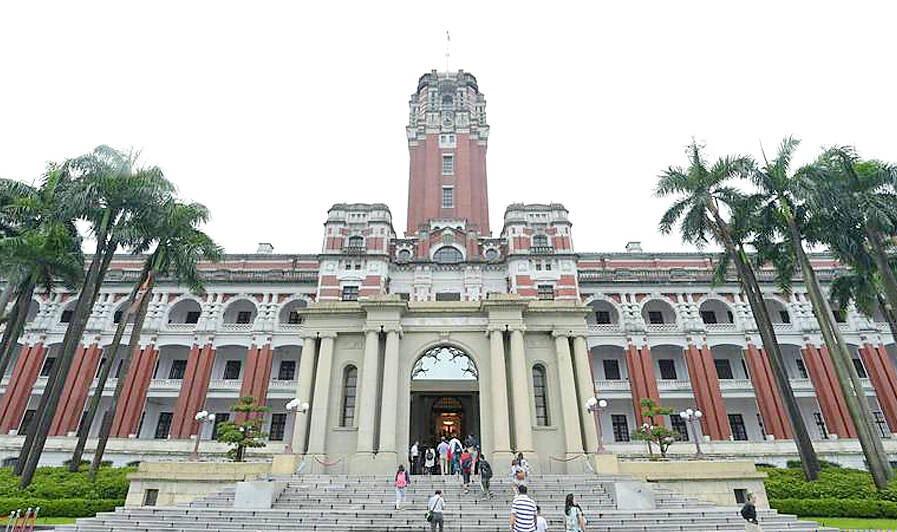The Supreme Court on Friday upheld espionage charges against two military officers who formerly served as presidential guards, but reduced their sentences.
Judges found that retired military officer Sun Han-fang (孫翰方) and his nephew, Wang Wen-yen (王文彥), a former officer at the National Security Bureau’s Special Service Center, guilty of contravening the National Security Act (國家安全法) and Criminal Code of the Armed Forces (陸海空軍刑法), for spying and passing to Chinese intelligence officials an itinerary of President Tsai Ing-wen (蔡英文).
The High Court in 2021 sentenced Sun to three years and four months in prison, and Wang to one year and 10 months.

Photo: Taipei Times file
The Supreme Court reduced Sun’s prison term to two years and two months, and Wang’s to one year and four months.
In their ruling, the judges reprimanded the pair for undermining national security after having served as military officers.
The judges said there was sufficient evidence that the duo had obtained classified materials related to the Presidential Office.
They said their prison terms were reduced because there was no definitive proof that they had obtained and passed on to China the itineraries of Tsai, and US and Japanese politicians who visited Taiwan and met with her in 2018.
Sun was recruited from the military to work at the Presidential Office’s Department of Security Affairs, and served as a guard for former presidents Chiang Ching-kuo (蔣經國) and Lee Teng-hui (李登輝).
When he retired in 1991, Sun was a lieutenant colonel. He became chief secretary for then-Chinese Nationalist Party (KMT) lawmaker Wu Ke-ching (吳克清), before going to Guangzhou, China, in the early 2000s, where he worked as an administrative secretary for a law firm specializing in handling cross-strait regulations for businesses, prosecutors said.
A Chinese intelligence official surnamed Fang (方) met Sun at social events organized by the Taiwanese business community in Guangzhou, promising to pay him up to US$3,000 for confidential military materials, and to organize a tour in China for active members of Taiwan’s military, the ruling said.
On a trip back to Taiwan, Sun persuaded Wang to access confidential material about the president’s security detail, the ruling said.
Investigators found that Wang started spying in 2008, and was able to obtain the personal files of commanding officers and the on-duty rotation schedule of presidential security guards, during the tenures of former presidents Chen Shui-bian (陳水扁) and Ma Ying-jeou (馬英九).
Wang was promoted to lead one of the Military Police Command’s security guard units when Tsai began her first presidential term in 2016.
Sun instructed Wang to procure confidential material, including the names, ranks, job descriptions and contact information of officers responsible for security arrangements at the Presidential Office, as well as the on-duty security rotation schedule, the ruling said.
Wang received payments for obtaining these confidential materials, and Sun treated Wang to trips to Bali, Singapore and South Korea from 2008 to 2016, it said.

The High Prosecutors’ Office yesterday withdrew an appeal against the acquittal of a former bank manager 22 years after his death, marking Taiwan’s first instance of prosecutors rendering posthumous justice to a wrongfully convicted defendant. Chu Ching-en (諸慶恩) — formerly a manager at the Taipei branch of BNP Paribas — was in 1999 accused by Weng Mao-chung (翁茂鍾), then-president of Chia Her Industrial Co, of forging a request for a fixed deposit of US$10 million by I-Hwa Industrial Co, a subsidiary of Chia Her, which was used as collateral. Chu was ruled not guilty in the first trial, but was found guilty

DEADLOCK: As the commission is unable to forum a quorum to review license renewal applications, the channel operators are not at fault and can air past their license date The National Communications Commission (NCC) yesterday said that the Public Television Service (PTS) and 36 other television and radio broadcasters could continue airing, despite the commission’s inability to meet a quorum to review their license renewal applications. The licenses of PTS and the other channels are set to expire between this month and June. The National Communications Commission Organization Act (國家通訊傳播委員會組織法) stipulates that the commission must meet the mandated quorum of four to hold a valid meeting. The seven-member commission currently has only three commissioners. “We have informed the channel operators of the progress we have made in reviewing their license renewal applications, and

Taiwan People’s Party (TPP) Chairman Huang Kuo-chang (黃國昌) yesterday appealed to the authorities to release former Taipei mayor Ko Wen-je (柯文哲) from pretrial detention amid conflicting reports about his health. The TPP at a news conference on Thursday said that Ko should be released to a hospital for treatment, adding that he has blood in his urine and had spells of pain and nausea followed by vomiting over the past three months. Hsieh Yen-yau (謝炎堯), a retired professor of internal medicine and Ko’s former teacher, said that Ko’s symptoms aligned with gallstones, kidney inflammation and potentially dangerous heart conditions. Ko, charged with

Taiwan-based publisher Li Yanhe (李延賀) has been sentenced to three years in prison, fined 50,000 yuan (US$6,890) in personal assets and deprived political rights for one year for “inciting secession” in China, China's Taiwan Affairs Office spokesman Chen Binhua (陳斌華) said today. The Shanghai First Intermediate People’s Court announced the verdict on Feb. 17, Chen said. The trial was conducted lawfully, and in an open and fair manner, he said, adding that the verdict has since come into legal effect. The defendant reportedly admitted guilt and would appeal within the statutory appeal period, he said, adding that the defendant and his family have